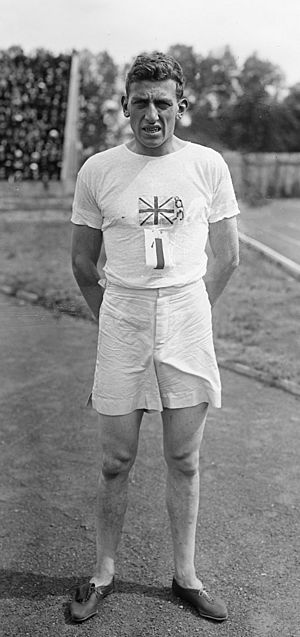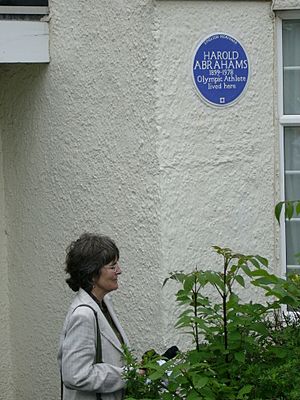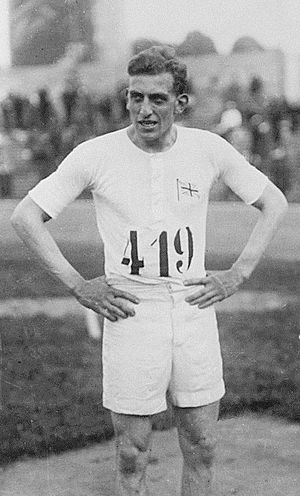Harold Abrahams facts for kids

Abrahams in June 1921
|
||||||||||||||
| Personal information | ||||||||||||||
|---|---|---|---|---|---|---|---|---|---|---|---|---|---|---|
| Full name | Harold Maurice Abrahams | |||||||||||||
| Born | 15 December 1899 Bedford, Bedfordshire, England |
|||||||||||||
| Died | 14 January 1978 (aged 78) Enfield, London, England |
|||||||||||||
| Resting place | St John the Baptist, Great Amwell | |||||||||||||
| Alma mater | University of Cambridge | |||||||||||||
| Occupation | Lawyer, journalist | |||||||||||||
| Height | 6 ft 0 in (183 cm) | |||||||||||||
| Weight | 165 lb (75 kg) | |||||||||||||
| Spouse(s) |
Sybil Evers
(m. 1936; died 1963) |
|||||||||||||
| Sport | ||||||||||||||
| Country | Great Britain | |||||||||||||
| Sport | Track and field | |||||||||||||
| Event(s) | 100–400 m, long jump | |||||||||||||
| University team | Cambridge University Athletics Club | |||||||||||||
| Coached by | Sam Mussabini | |||||||||||||
| Achievements and titles | ||||||||||||||
| Personal best(s) | 100 yd – 9.9 (1924) 100 m – 10.6 (1924) 200 m – 21.9 (1924) 440 yd – 50.8 (1923) LJ – 7.38 m (1924) |
|||||||||||||
|
Medal record
|
||||||||||||||
Harold Maurice Abrahams CBE (15 December 1899 – 14 January 1978) was a famous English track and field athlete. He won a gold medal at the 1924 Olympics in the 100 metres sprint. His amazing story was later shown in the 1981 film Chariots of Fire.
Contents
Harold Abrahams' Life Story
Growing Up and School
Harold Abrahams's father, Isaac, was a Jewish immigrant from Poland. He moved to Bedford, England, with his Welsh Jewish wife, Esther Isaacs. Harold was born in Bedford in 1899.
He had two older brothers who were also very successful. His eldest brother, Sir Adolphe Abrahams, became a doctor and started British sport medicine. His middle brother, Sir Sidney Abrahams, was also an Olympic athlete who competed in the long jump.
Harold went to Bedford School and Repton School. After that, he studied at Gonville and Caius College, Cambridge, from 1919 to 1923. Before university, Harold served as a lieutenant in the British Army. Later, he trained to become a lawyer. At Cambridge, he was part of the university's athletics club and other student groups.
Becoming an Olympic Sprinter
Harold Abrahams was a natural sprinter and long jumper from a young age. He continued to compete in running while at Cambridge. He joined the British team for the 1920 Summer Olympics. There, he competed in the 100 m and 200 m races, and the long jump. He also helped the British relay team finish fourth in the 4 × 100 m race.
Even though Abrahams was a top athlete in Britain, he wanted to get even better. After finishing university, he hired a professional coach named Sam Mussabini. Mussabini helped him improve his running style and training methods for the 1924 Summer Olympics in Paris, France.
For six months, they focused mainly on the 100 m race. Abrahams trained very hard, perfecting his start, stride, and running form. One month before the 1924 Games, he set a new English record in the long jump. This record stood for 32 years!
Winning Gold at the 1924 Olympics
At the 1924 Summer Games, Harold Abrahams won the gold medal in the 100 m race. He finished in 10.6 seconds, beating many strong American runners. One of them was Charley Paddock, who had won gold in 1920.
His teammate Arthur Porritt came in third place. Abrahams and Porritt became good friends and celebrated their win every year on July 7th.
Another British runner, Eric Liddell, chose not to run in the 100 m race because one of the heats was on a Sunday. Both Liddell and Abrahams competed in the 200 m race. Liddell won a bronze medal, and Abrahams finished sixth. Liddell then went on to win a gold medal in the 400 metres.
Abrahams was also the first runner for the British 4 × 100 m relay team, which won the silver medal.
Life After Running
In May 1925, Harold Abrahams broke his leg while long-jumping. This injury ended his career as an athlete. He then went back to his legal career as a lawyer.
In 1928, he was the team captain for the British Olympic team at the 1928 Summer Olympics in Amsterdam. He also wrote the official report for those games. For the next forty years, he worked as a sports journalist and became a commentator for BBC radio.
Later in his life, he became president of the Jewish Athletic Association. He also served as chairman for the Amateur Athletic Association (AAA).
Harold Abrahams wrote several books about sports and the Olympics. He was also present when Roger Bannister became the first person to run a mile in under four minutes in 1954.
Abrahams passed away in Enfield on 14 January 1978, at the age of 78. He was buried next to his wife, Sybil Evers.
Harold Abrahams' Family Life
In 1936, Harold Abrahams married D'Oyly Carte Opera Company singer Sybil Evers. In the film Chariots of Fire, his relationship is shown a bit differently, but it captures the spirit of their bond.
Harold cut a piece of gold from his Olympic medal to make Sybil's wedding ring. Sadly, both the medal and the ring were later stolen at different times.
Sybil Evers could not have children, so they adopted a boy named Alan in 1942 and a girl named Susan in 1946. During World War II, they also helped two Jewish refugee children by fostering them.
Sybil Evers died in 1963. After her death, Harold created two awards in her memory. One was a singing prize, and the other was a trophy for the best British woman athlete. This trophy is still presented each year at Buckingham Palace.
Harold Abrahams was also a fan of Gilbert and Sullivan operas, which was shown in Chariots of Fire.
Honours and Legacy

Harold Abrahams was made a Commander of the Order of the British Empire (CBE) in 1957. This is a special award from the British government.
He has been honored with two English Heritage Blue plaques. One is at his former home in Golders Green, London, where he lived during his greatest successes. The other plaque is at his birthplace in Bedford.
Harold Abrahams was famously portrayed by actor Ben Cross in the 1981 film Chariots of Fire. The movie won four Academy Awards, including Best Picture. The film uses his memorial service as a way to tell his story and the story of Eric Liddell.
In 1981, Abrahams was inducted into the International Jewish Sports Hall of Fame. He was also inducted into the England Athletics Hall of Fame in 2009.
A memorial plaque was unveiled in Telford in 2014. This was to remember that before the 1924 Olympics, he won a gold medal in the 100-yard sprint at a local championship there.
Norris McWhirter, a famous sports statistician, once said that Abrahams "managed by sheer force of personality... to raise athletics from a minor to a major national sport." This shows how important Harold Abrahams was to British athletics.
See also
 In Spanish: Harold Abrahams para niños
In Spanish: Harold Abrahams para niños
 | Sharif Bey |
 | Hale Woodruff |
 | Richmond Barthé |
 | Purvis Young |


